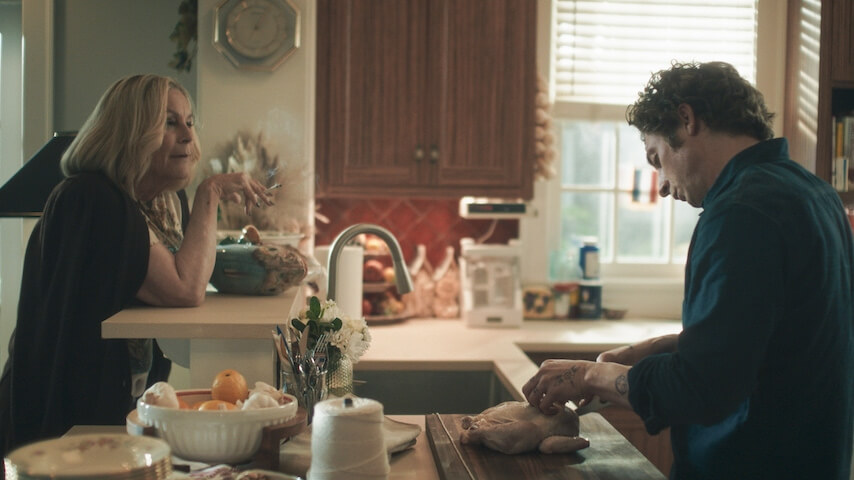The Bear’s world-building once revolved around the specific love language of cooking. Simmering underneath the loud kitchen mayhem, bruised egos, and a whole lot of trauma were meals—however simple or chaotic—representing the characters’ hunger for professional success and purpose. The show’s early compelling driving force, for example, was whether fine-dining chef Carmy (Jeremy Allen White), insecure yet lovable sidekick Richie (Ebon Moss-Bachrach), and cool new hire Sydney (Ayo Edebiri) could preserve a beloved sandwich spot, modernize it, and achieve artistic excellence in a pressure-cooker environment. And the food they aimed to serve was a unique gateway into understanding these characters’ mindsets and passions.
Take Syd’s cola-braised short ribs over risotto, an early sign that she was ready to go toe-to-toe with Carm to mesh culinary nostalgia with inventiveness and leave her mark on the River North joint. Or pastry chef Marcus (Lionel Boyce), who in season one dedicated himself to perfecting the classic donut, undeterred even by the bedlam taking place in “Review.” And that flashback of Carmy and his deceased brother, Mikey (Jon Bernthal), making braciole for the Berzattos established a sweet shorthand between them, underlining why the latter’s loss laid heavily on Carm, Richie, and Natalie (Abby Elliott). The portrayal of breaking bread, including the premiere’s pivotal family-meal scene, carried a certain level of tenderness that season four lacks.
Over the past couple of years, The Bear has unfortunately pushed itself into a pretentious corner by prioritizing moody lighting, stylish montages, expensive needle drops, and distracting guest appearances. Instead of using these cinematic tricks sparingly to make a point, the Christopher Storer-created series leans on them to make up for dull narrative momentum. So watching Syd fire up scallops in episode three of this new batch of episodes, under hues of pink and blue and with St. Vincent’s “Slow Disco” playing in the background, is certainly lovely. But the scene doesn’t feel as tactile or emotionally potent as when, say, she whipped up an omelette for a pregnant, tired Nat. That fantastic (and viral) season two visual—amplified by the sound of butter sizzling, metal clanking, potato chips rustling—signified the care she put into the dish. More importantly, the simple task reinvigorated Syd’s spirit after spending days arguing with Carmy.
Cooking is an inextricable part of the FX show, but it’s not a visceral or affecting tool for studying characters anymore. Look no further than Marcus, whose season-two arc in Copenhagen was pivotal to his growth. While training under Chef Luca (Will Poulter) and learning to craft gourmet desserts like a minty Snickers bar, Marcus was able to both deal with his grief in isolation and find a way to elevate his culinary skills. No wonder he came up with The Bear’s signature honey bun that, like Syd before him, made his contribution to the restaurant invaluable. But watching his process from ideation to plating is what made it grab you. In season four, Marcus presents a stellar-looking sweet treat to Carmy and Luca (a concoction of dehydrated pear, violet caramel, and shiso), but the inspiration for it is absent. So it rings hollow when he goes on to become one of Food & Wine‘s Best New Chefs later in the season’s run.
Marcus’ half-baked subplot can be blamed on what The Bear has focused on instead this time around: arcs that drag out way too long. Sydney’s delay in looking at her agreement—or giving a firm answer to Chef Adam’s (Adam Shapiro) job offer—and Carmy’s postponement in visiting his niece for weeks after she’s born (but time spent at the Frank Lloyd Wright Home and Studio) are, frankly, frustrating.
As far as Tina, you’d be forgiven if you forgot that Liza Colón-Zayas won an Emmy award last year for her performance on this show, considering just how much The Bear sidelines her this year. For some odd reason, Tina’s time in the kitchen is consolidated to whether or not she can figure out how to complete a pasta dish in under three minutes. After watching her backstory in season three’s “Napkins” and her overall professional journey, Tina getting benched is symptomatic of The Bear succumbing to flashiness over fleshing out some of its beloved characters.
Meanwhile, Carmy has seemingly lost all interest in the art of cooking—or interest in the effects that art has on him. So he’s understandably hardly behind the burners in season four and instead agreeing that there should be a fixed menu—something he would have fought hard against last season—with basically a shrug. But it would have been a great, dramatic, full-circle moment—one with dashes of that aforementioned, heartfelt omelette scene—to show him actually cooking that chicken for Donna in the penultimate episode.
Season four has a few exemplary moments—particularly in the shouty, play-like finale—that harken back to The Bear‘s former strengths and magic. But for the most part, the show has fallen into a disappointingly self-indulgent pattern that lacks the propulsive tension that made it tick. With its special sauce missing, the series has become, to paraphrase the Trib review about the restaurant at its center, notably inconsistent.

 Keep scrolling for more great stories.
Keep scrolling for more great stories.
